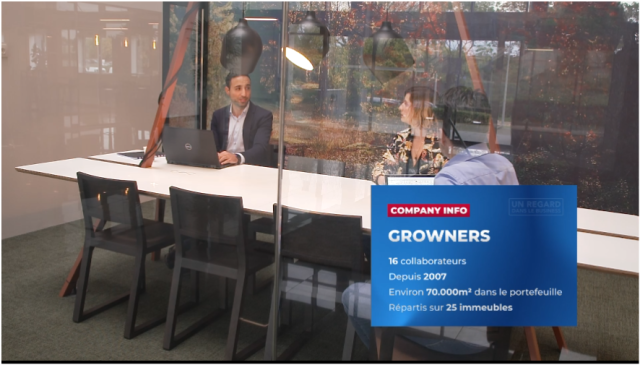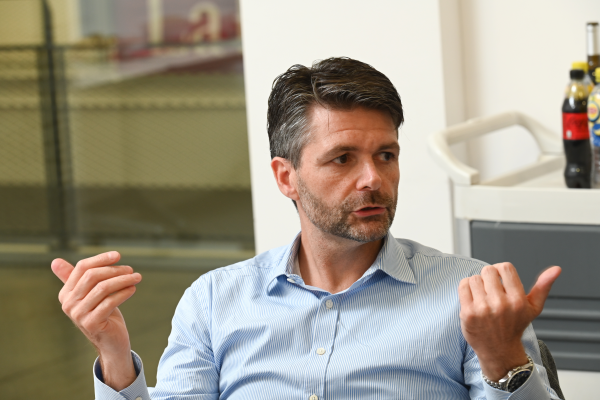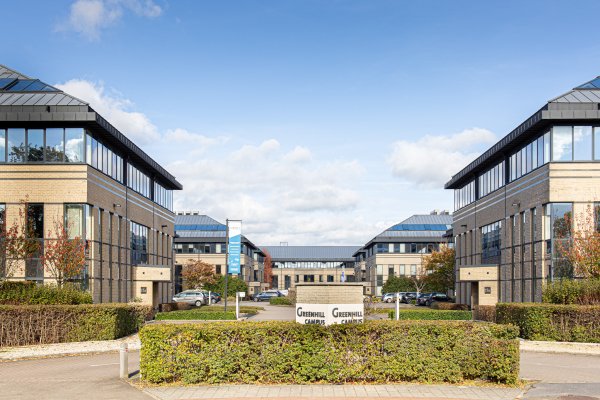Our business: allow SME's to buy their workplace with the same cash-flow as a lease

Article written by Thierry Laffineur - Interview with Eric Bastin, Growners' CEO
« The office is the vital focus of any company: it is the location of its identity, its economic activity and its relational focus.»
Founded in 2004, (*) and dealing in tertiary, commercial and logistics property since 2007, GROWNERS is responding to market demands, coming from SMEs seeking a secure place for some of their liquidity, choosing real estate by purchasing their own, optimised workplaces.
These spaces are located within a professional, tertiary sector environment, customised and upgraded with the appropriate fixtures and fittings, and with access to a range of services for their occupants.
Office: the essential place for your business
« We meet the needs of SMEs wishing to find a secure place for their liquidity, by purchasing their own workplaces. »
Q. : What features enhance a company's workspace? ?
E . Bastin : The flood of economic, environmental, health and geopolitical challenges of our times has links to deep-seated social changes. Hybrid working, in-person and remote, is one of these. This shift, regardless of the order and number of days of home and office work, still leaves one fundamental feature in place: The office remains the essential location of any company.
It is the central point of the company’s identity, and an anchorage which, among other things, ensures the long-term loyalty of its employees. This loyalty is beneficial, by countering high staff turnover, that leads to losses in productivity and profits, inevitable as any new hiring requires a training period.
Alongside this, while the office is necessarily the focus of the economic activity of any company, it is also its relational focus. It is where team spirit is formed, a sense of belonging and involvement, mutual trust and a friendly atmosphere, intangible elements which aren't available through Zoom and other remote working tools.
Providing effective spaces, appropriate for SME's
Q. : How do you describe Growners’ work in this context?
E. Bastin : It means purchasing properties which are obsolete in terms of space, technology and/or energy, from various market sources (Funds, SIR, Corporates, etc.). These properties are then refurbished, legally ‘re-allocated’ (into units of between 100 and 800 m²) before being offered for sale to SMEs wishing to purchase their own workspaces, while also securing their cashflow. Dividing the buildings into units also allows businesses to create their own, almost tailor-made workspaces, by grouping units together.
Obsolete buildings are purchased (Growners currently has some 70,000 m² of business property) using financial arrangements in partnership with BNP, Belfius, Securex and other institutional sources. The trust shown in us by these institutions is based on our ability to ‘buy well’. It is in fact just because we buy well that we can then put these reconditioned properties onto the market, with the best benchmarks and thus the most competitive prices for an SME.
Upgrading: physical factors...
Q. : Upgrading obsolete spaces means working on both physical and financial parameters. What are these?
E. Bastin : The physical parameters are based on 3 aspects.
- Increasing the energy performance of a building. These are mainly tasks involving the insulation/ventilation of the property, and installing new heating systems (e.g.: solar panels coupled with heat pumps). In practice, this work aims to gain at least 1 PEB level (e.g.: move from D to C or B).
- Installing PMEs in a customised ‘corporate’ environment. These spaces, designed for the tertiary sector, provide facilities which are now essential for companies: accessibility and parking spaces with charging points, amenities (cloakrooms, garages, showers) for all soft mobilities, provision of shared spaces (meeting rooms), etc.
It is also important to provide the occupants - basically, the co-owners of the building - with an
impeccable image for their visitors. Hence, we always invest in the welcome areas (desk, hall, etc.), which must be designed with especial care. - Offer services. Upgrading a working area is a sine qua non for its attraction to employees, encouraging loyalty among talents and the return to in-person working. This assumes that we can consistently offer personal services, either in-house or externally via our caretaking facilities.
… And financial factors
As we deal almost exclusively with SMEs (10 to 100 people), the financial factors must be considered under two headings: the purchase/operating cost AND taxation. These two factors naturally depend on the geographical location of the property.
So, average purchase costs will vary from 900 > 1200 €/m² on the outskirts of Brussels, to 2000 > 2500 €/m² dans le CBD (Central Business District) while they will fluctuate between 1200 and 1500 €/m² in local business parks (Riverside – Anderlecht) or regional business parks such as the Green Hill Campus in the Haasrode Research Park, Leuven. (**) .
Taxation: look beyond the 19 municipalities !
« Given Brussels taxes of 80 €/m², we advise SMEs to look to the outskirts of the city, where the tax is only 35€/m². »
In terms of taxation, our message is also to persuade SMEs to look beyond the CBD’s 19 municipalities, for the very sensible reason of the difference in taxation: 80€/m² in the CBD, compared to 35€/m² on the outskirts! This is an argument that is still not given sufficient weight by many small and medium-sized enterprises.
Integrate our business model into the needs of SME's
Q. : How and why is your business model integrated into the needs of SME's ?
E. Bastin : Let's make a preliminary point. For obvious conflict of interest reasons (being judge and jury), we are neither trustee nor property manager. Our business model is that of upgrading a stock of obsolete buildings and, in that way reviving workspaces and urban or suburban districts.
This approach cannot be separated from the principle of circularity, recycling, and urban mining. (***)
Aside from the fact that the impact of renovation has a carbon and environmental footprint 60 times smaller than of demolition/reconstruction, the protocol we follow is that of ‘giving a second life’ to buildings that are otherwise condemned. This philosophy is now filtering through to SMEs. Once they gain the status of ‘occupant co-owners’, these enterprises in fact extend their social role. Beyond the performance linked to their own economic activities, they also contribute to the resurgence of the social and urban fabric.
Picture Eric Bastin © J.L. Flémal
(*) Founded in 2004 by Vincent Schobbens
(**) The Green Hill Campus comprises nine zero-fossil energy buildings, in the Haasrode Research Park (Leuven). It demonstrates the package offered by Growners: a range of spaces/units (177>5000 m², or even more), available for sale or lease, including storage and parking spaces. Located on the outskirts of Leuven (close to the E40 Liège-Bruxelles) it is served by De Lijn buses, and has a meal service on site.
(***) For instance, removing external glazing, and re-using it for glass walls inside.


